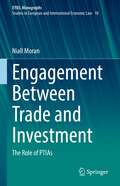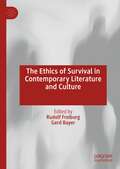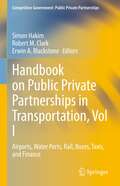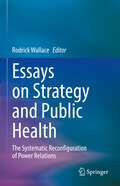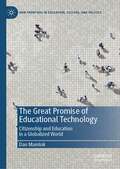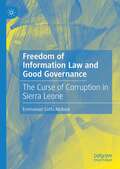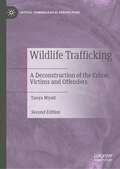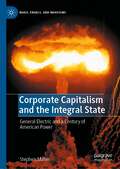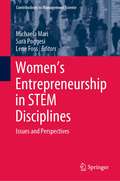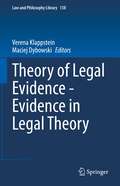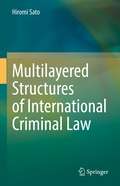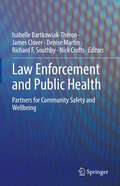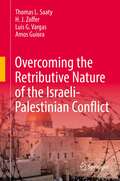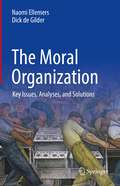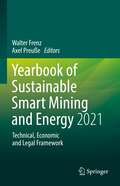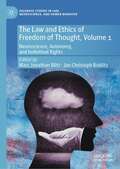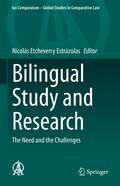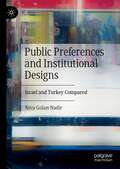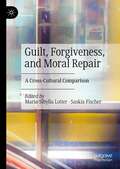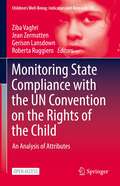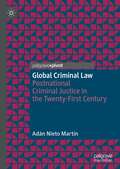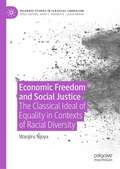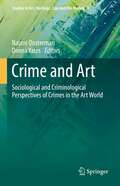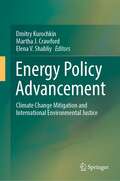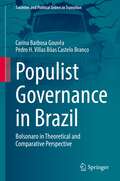- Table View
- List View
Engagement Between Trade and Investment: The Role of PTIAs (European Yearbook of International Economic Law #18)
by Niall MoranThis book explores engagement between the trade and investment law regimes and the extent to which this is being driven by Preferential Trade and Investment Agreements (PTIAs). It provides an empirical analysis of engagement between the two regimes using data from 60 PTIAs and 60 Bilateral Investment Treaties concluded between 2005-2019 to see whether PTIAs result in increased engagement and whether they are doing so over time. The book explores eight of the factors identified as evidencing inter-regime engagement. These chapters look at when engagement is appropriate and to what extent it is appropriate in relation to each of these areas. Based on the findings of this book’s empirical and comparative law analysis of PTIAs, BITs, and the trade and investment law regimes, the book examines whether the conclusion of PTIAs compared to BITs has resulted in increased levels of engagement between the trade and investment law regimes.This book does not put forth the view that convergence between trade and investment is always appropriate, but provides recommendations as to how treaties may be formulated and interpreted in a manner that takes inter-regime engagement into account with a view to ensuring the harmonious simultaneous development of the two regimes. The question of the future direction for engagement between the trade regime and the investment regime is very topical in light of changes to the architecture of both regimes at present.
The Ethics of Survival in Contemporary Literature and Culture
by Gerd Bayer Rudolf FreiburgThe Ethics of Survival in Contemporary Literature and Culture delves into the complex problems involved in all attempts to survive. The essays analyze survival in contemporary prose narratives, short stories, poems, dramas, and theoretical texts, but also in films and other modes of cultural practices. Addressing diverse topics such as memory and forgetting in Holocaust narratives, stories of refugees and asylum seekers, and representations of war, the ethical implications involved in survival in texts and media are brought into a transnational critical discussion. The volume will be of potential interest to a wide range of critics working on ethical issues, the body, and the politics of art and literature.
Handbook on Public Private Partnerships in Transportation, Vol I: Airports, Water Ports, Rail, Buses, Taxis, and Finance (Competitive Government: Public Private Partnerships)
by Erwin A. Blackstone Simon Hakim Robert M. ClarkThis book discusses the role of public-private partnerships (PPPs) in global transportation infrastructure. Seen as a way to provide vital services in an era of shrinking government budgets, public-private partnerships have become an increasingly important part of travel infrastructure worldwide. This book describes and analyzes the structure of various models of PPPs in various countries, evaluating their effectiveness, and drawing policy implications for future use. Written by leading international researchers and practitioners in the transportation field, each chapter is a case study on the adoption, implementation, and outcome of transportation services in different municipalities. Taken together, these diverse case studies provide an integrated framework for evaluating and using PPPs. Providing rigorous empirical analysis of PPPs in transportation, this volume will be of interest to researchers in public administration, political science, and economics as well as practitioners and policymakers involved in establishing and monitoring PPPs in transportation.
Essays on Strategy and Public Health: The Systematic Reconfiguration of Power Relations
by Rodrick WallaceThis book is a collection of essays that explore commonalities and contrasts between strategy in armed conflict and strategy in public health. The first part uses the asymptotic limit theorems of information and control theories to study strategy as an exchange of messages between adversaries, in the context of underlying power relations. The ‘messages’ to be exchanged are constructed from an ‘alphabet’ of tactics available to each contender, in a large sense. The second part of the book explores four case histories from this perspective, ranging across agribusiness-generated pandemics, through tuberculosis and COVID-19. The final chapter attempts a strategic synthesis applicable more specifically to public health than to the remarkably – and disturbingly -- close parallel of armed conflict. Taking a unique approach to public health tactics and strategy this volume will be of interest to social epidemiologists, public health economists, public policy scientists, as well as public health researchers and practitioners.
The Great Promise of Educational Technology: Citizenship and Education in a Globalized World (New Frontiers in Education, Culture, and Politics)
by Dan MamlokThis book critically looks at the tensions between the promise to transform education through the use of digital technology and the tendency to utilize digital technology in instrumental and technical ways. The widespread use of digital technology has had a remarkable effect on almost every domain of human life. This technological change has caused governments, educational departments, and non-governmental organizations (NGOs) to recognize the need to develop educational plans that would support the social and the cultural changes that have occurred with the ubiquitous permeation of digital technology into our everyday lives. This book challenges common assumptions regarding digital technology and education, through critical exploration of educational policies, interviews, and class observations in the US and Israel. In doing so, the author sheds light on the possibilities of advancing digital citizenship under current educational policies.
Freedom of Information Law and Good Governance: The Curse of Corruption in Sierra Leone
by Emmanuel Saffa AbdulaiThis book argues that Sierra Leone’s ten-year civil conflict demonstrates the criticality of freedom of information (FOI) as a facet of good governance where corruption thrives, spanning both public and private sectors, if Sierra Leone’s continued security and stability are to be ensured. It argues that it was the absence of an anti-corruption tool like FOI and its attendants, transparency, and accountability, in governance generally, and in the area of the extractive industry in particular, that lead to other social phenomena which directly sparked the war. It proffers that for the continued consolidation of peace, security, stability and development in Sierra Leone, transparency and accountability must be ensured by protecting and implementing the demand driven anti-graft FOI.Straddling the disciplines of law, political science, public policy, and history, the book’s major premise is that it was the absence of FOI in the area of governance and the extractive industry, which enabled politicians, civil servants and the politically connected to ransom and exploit Sierra Leone’s mineral resources for their own profit with impunity, a state of affairs which led to underdevelopment, state collapse and an embittered civil populace especially the youth. The book postulates that as such any attempt to ensure long-term peace in Sierra Leone, should seek to avoid replicating the conditions that gave rise to that gruesome conflict- elites expropriation of national resources through endemic graft. The book proposes the comprehensive and effective implementation of the Right to Information Act 2013.
Wildlife Trafficking: A Deconstruction of the Crime, Victims and Offenders (Critical Criminological Perspectives)
by Tanya WyattThis book provides a comprehensive, global exploration of the scale, scope, threats, and drivers of wildlife trafficking from a criminological perspective. Building on the first edition, it takes into account the significant changes in the international context surrounding these issues since 2013. It provides new examples, updated statistics, and discusses the potential changes arising as a result of COVID-19 and the IPBES 2019 report. It also discusses the shift in trafficking ‘hotspots’ and the recent projects that have challenged responses to wildlife trafficking. It undertakes a distinctive exploration of who the victims and offenders of wildlife trafficking are as well as analysing the stakeholders who are involved in collaborative efforts to end this devastating green crime. It unpacks the security implications of wildlife trade and trafficking and possible responses and ways to combat it. It provides useful and timely information for social and environmental/life scientists, law enforcement, NGOs, and policy makers.
Corporate Capitalism and the Integral State: General Electric and a Century of American Power (Marx, Engels, and Marxisms)
by Stephen MaherThis book advances an original conception of the relationship between state and corporate power in the United States. Using what he terms an Institutional Marxist framework, Maher argues that, far from passively responding to interest group pressures, the state has been a key agent in politically mobilizing business, and has played an active role in the organization of lobbying groups. Such business associations do not merely express the pre-existing interests of their corporate members, but are also mechanisms through which the state organizes the political power of the capitalist class. They form part of what the author refers to as an integral state—a wider network of state power which traverses and interpenetrates the state bureaucracy, the legislature, the industrial policy apparatus, and corporate governance. Based on extensive archival research, this book tracks the role of the General Electric Company as a pillar of the integral state in the United States from the finance capital period (1880 to 1930), through the managerial period (1930-1979), to the restructuring leading up to the age of neoliberalism (1979-present).
Women's Entrepreneurship in STEM Disciplines: Issues and Perspectives (Contributions to Management Science)
by Lene Foss Michaela Mari Sara PoggesiThis book presents scholarly reflections on women's entrepreneurial propensity and on women's entrepreneurship in Science, Technology, Engineering, and Mathematics (STEM) fields. Contributing to a country's innovativeness and competitiveness, women entrepreneurs also promote healthy social and economic growth and act as mentors and role models for younger women. However, the low involvement of women in STEM, which begins at education, affects the share of women entrepreneurs in these fields. The authors address these issues and highlight the output of research studies by bringing together both global and country-specific evidence. Researchers and policymakers interested in advancing women's entrepreneurship, especially in STEM, will particularly benefit from this book.
Theory of Legal Evidence - Evidence in Legal Theory (Law and Philosophy Library #138)
by Verena Klappstein Maciej DybowskiThis book addresses theoretical problems concerning legal evidence. The concept of evidence is expected to fulfill a number of distinct roles in science and philosophy, but also in legal theory and law, some of which are complementary, while others are conflicting. In their profession, lawyers have to deal with evidence and proof. Yet the legal concept of evidence is constantly changing, and the debate concerning the distinction between a legal concept of evidence, the ordinary concept of evidence and the concept of evidence in science is far from being settled. What is more, the problem of evidence is central to both epistemology and the philosophy of science, and by extension to our academic thinking on law. In short, legal theorists’ interest in evidence may include such diverse objects as a bloody knife, sensory data, linguistic entities or psychologically recognized beliefs. The book surveys selected theoretical roles that the concept of evidence plays and explores their relations and interconnections. The content is divided into three parts, investigating: (1) evidence in epistemology and the philosophy of science, which focuses on evidence methodologies and the problem of proof in legal scholarship; (2) evidence in legal theory and legal philosophy, where particular attention is paid to the interplay between evidence, legal reasoning and the binding force of such reasoning; and (3) evidence in law, where theoretical problems pertaining to witnesses, expert opinions, explanations of the accused, statistical evidence and neuroscientific evidence are examined.
Multilayered Structures of International Criminal Law
by Hiromi SatoThis book discusses the multilayered legal structures concerning the regulation of crimes under international law. It covers both core crimes and other types of crime under international law, and examines relevant substantive and procedural rules alike. Pursuing such a comprehensive approach is essential to understanding the basic frameworks of international criminal law, since the varied perspectives on international crimes are connected to different systems of enforcement. Being aware of this interrelatedness is conducive to an in-depth examination of individual topics in both substantive and procedural aspects. On the basis of such an inquiry, this book concisely provides a systematic overview of international criminal law.
Law Enforcement and Public Health: Partners for Community Safety and Wellbeing
by Denise Martin Isabelle Bartkowiak-Théron James Clover Richard F. Southby Nick CroftsThe expanding remit of policing as a fundamental part of the public health continuum is increasingly acknowledged on the international scene. Similarly the growing role of health professionals as brokers of public safety means that the need for scholarly resources for developing knowledge and broadening theoretical positioning and questioning is becoming urgent and crucial. The fields of law enforcement and public health are beginning to understand the inextricable links between public safety and public health and the need to shift policies and practices towards more integrated practices. This book comes as a first, an utterly timely scholarly collection that brings together the views of multidisciplinary commentators on a wide range of issues and disciplines within the law enforcement and public health (LEPH) arena. The book addresses the more conceptual aspects of the relationship as well as more applied fields of collaboration, and the authors describe and analyze a range of service delivery examples taken from real-life instances of partnerships in action. Among the topics covered:Defund, Dismantle or Define Law Enforcement, Public Health, and Vulnerability Law Enforcement and Mental Health: The Missing Middle The Challenges of Sustaining Partnerships and the Diversification of Cultures Using Public Health Concepts and Metrics to Guide Policing Strategy and Practice Policing PandemicsLaw Enforcement and Public Health: Partners for Community Safety and Wellbeing is essential reading for a wide array of professions and areas of expertise in the intersectoral field of LEPH. It is an indispensable resource for public health and law enforcement specialists (practitioners, educators, scholars, and researchers) and training programs across the world, as well as individuals interested in developing their knowledge and capacity to respond to complex LEPH issues in the field, including public prosecutors, coroners, and the judiciary. The text also can be used for undergraduate and postgraduate university policing, criminology, sociology, psychology, social work, public health, and medicine programs.
Overcoming the Retributive Nature of the Israeli-Palestinian Conflict
by Thomas L. Saaty Luis G. Vargas H. J. Zoffer Amos GuioraThis book presents an interdisciplinary approach to conflict solution focusing on a very specific type of conflict, retributive conflicts . It is unique in the treatment of these and how relative measurement is used to find equilibrium solutions. The authors present an alternative process to address the Israeli-Palestinian conflict. They do so in two ways that are different from past efforts. The first is by formally structuring the conflict and the second is the manner in which discussions were conducted and conclusions drawn. The approach will help create a solution and provide negotiators with a unique pathway to consider the thorny issues and corresponding concessions underlying the deliberations, together with their implementation. The Analytic Hierarchy Process (AHP) provides a way to conflict solution with the participation of negotiators for the parties. It is a positive approach that makes it possible to reason and express feelings and judgments with numerical intensities to derive priorities. With the assistance of panels of Israeli participants and Palestinian participants brought together in 2006 to 2017, AHP was applied for the first time in a group setting to the Palestinian-Israeli conflict. The process makes it clear that moderation in different degrees by both sides is essential to arrive at acceptable agreements on concessions proposed and agreed upon by both sides.
The Moral Organization: Key Issues, Analyses, and Solutions
by Naomi Ellemers Dick de GilderInvestors, customers and employees increasingly expect organizations to take responsibility for the social impact of their activities. This book applies theory and research on moral psychology and social identity, to offer a new perspective on organizational social responsibility and business ethics. The authors use their unique approach to highlight recurring moral challenges in organizational behavior, such as leadership, work motivation, diversity, organizational change and stakeholder relations. Their analysis explains that people are reluctant to acknowledge and confront moral flaws in their workplace behavior, because this constitutes a source of identity threat. Common strategies to cope with this threat invite justifications and symbolic actions – and prevent moral improvement. Each chapter draws together a wealth of research findings and organizational cases. These not only identify and clarify common moral pitfalls, but also show ways to enhance the likelihood that organizations acquire the knowledge, willingness and ability to build an ethical work climate.
Yearbook of Sustainable Smart Mining and Energy 2021: Technical, Economic and Legal Framework (Yearbook of Sustainable Smart Mining and Energy - Technical, Economic and Legal Framework #1)
by Walter Frenz Axel PreußeThis book is at the center of the UN goals of combining environment and economic development with new technologies.First, sustainability in mining is defined as a process of transformation. This is followed by an outlook on the aspects of safety, economy, environmental impact and digital transformation. The book includes a discussion of new aspects such as the problem of liability for mining damages regarding climate change in Peru. Specific technical issues in smart mining are covered as well, such as underground localization systems based on ultra-wide band radio and inertial navigation, or the use of thermal imaging for roof crack detection. In addition, the characterization of material flows, subsurface hydrogen-storage systems and the prediction of mining induced subsidence and uplift are dealt with.The Sustainable Smart Mining and Energy Yearbook is not only aimed at researchers professionals, but at all who want to get an overview of the important technical and legal topics in this field.
The Law and Ethics of Freedom of Thought, Volume 1: Neuroscience, Autonomy, and Individual Rights (Palgrave Studies in Law, Neuroscience, and Human Behavior)
by Marc Jonathan Blitz Jan Christoph BublitzFreedom of thought is one of the great and venerable notions of Western thought, often celebrated in philosophical texts – and described as a crucial right in American, European, and International Law, and in that of other jurisdictions. What it means more precisely is, however, anything but clear; surprisingly little writing has been devoted to it. In the past, perhaps, there has been little need for such elaboration. As one Supreme Court Justice stressed, “[f]reedom to think is absolute of its own nature” because even “the most tyrannical government is powerless to control the inward workings of the mind.” But the rise of brain scanning, cognition enhancement, and other emerging technologies make this question a more pressing one. This volume provides an interdisciplinary exploration of how freedom of thought might function as an ethical principle and as a constitutional or human right. It draws on philosophy, legal analysis, history, and reflections on neuroscience and neurotechnology to explore what respect for freedom of thought (or an individual’s cognitive liberty or autonomy) requires.
Bilingual Study and Research: The Need and the Challenges (Ius Comparatum - Global Studies in Comparative Law #58)
by Nicolás Etcheverry EstrázulasThis book addresses the importance of bilingualism in legal education. Written by respected experts in the field, it presents reports on bilingual legal education in countries with such diverse cultures and histories as Belgium, Canada, China, the Czech Republic, Finland, France, Germany, Italy, Japan, Mexico, Romania, Singapore, Taiwan and the USA. The findings are also summarized in a General Report that was presented at the 20th IACL General Congress in Fukuoka, Japan.
Public Preferences and Institutional Designs: Israel and Turkey Compared
by Niva Golan-NadirThis book explores the existence of gaps between public preferences and institutional designs in democracies, and specifically cases in which such gaps are maintained for a long period of time without being challenged by the electorate. Gaps such as these can be seen in the complex relations between the state and religion in Israel and Turkey, and more specifically in their policies on marriage. This line of investigation is interesting both theoretically and empirically, as despite their poles apart policies, Israel and Turkey share a similar pattern of institutional dynamics. Existing explanations for this phenomenon suggested either civil society-based arguments or intra-institutional dynamics, as reasons for the maintenance of such gaps. This book enriches our understanding of policy dynamics in democratic systems by introducing a third line of argument, one that emphasizes the effective role state institutions play in maintaining such arrangements for long periods, often against the public will.
Guilt, Forgiveness, and Moral Repair: A Cross-Cultural Comparison
by Maria-Sibylla Lotter Saskia FischerIn current debates about coming to terms with individual and collective wrongdoing, the concept of forgiveness has played an important but controversial role. For a long time, the idea was widespread that a forgiving attitude — overcoming feelings of resentment and the desire for revenge — was always virtuous. Recently, however, this idea has been questioned. The contributors to this volume do not take sides for or against forgiveness but rather examine its meaning and function against the backdrop of a more complex understanding of moral repair in a variety of social, circumstantial, and cultural contexts. The book aims to gain a differentiated understanding of the European traditions regarding forgiveness, revenge, and moral repair that have shaped our moral intuitions today whilst also examining examples from other cultural contexts (Asia and Africa, in particular) to explore how different cultural traditions deal with the need for moral repair after wrongdoing.
Monitoring State Compliance with the UN Convention on the Rights of the Child: An Analysis of Attributes (Children’s Well-Being: Indicators and Research #25)
by Ziba Vaghri Jean Zermatten Gerison Lansdown Roberta RuggieroThis open access book presents a discussion on human rights-based attributes for each article pertinent to the substantive rights of children, as defined in the United Nations Convention on the Rights of the Child (UNCRC). It provides the reader with a unique and clear overview of the scope and core content of the articles, together with an analysis of the latest jurisprudence of the UN Committee on the Rights of the Child. For each article of the UNCRC, the authors explore the nature and scope of corresponding State obligations, and identify the main features that need to be taken into consideration when assessing a State’s progressive implementation of the UNCRC. This analysis considers which aspects of a given right are most important to track, in order to monitor States' implementation of any given right, and whether there is any resultant change in the lives of children. This approach transforms the narrative of legal international standards concerning a given right into a set of characteristics that ensure no aspect of said right is overlooked. The book develops a clear and comprehensive understanding of the UNCRC that can be used as an introduction to the rights and principles it contains, and to identify directions for future policy and strategy development in compliance with the UNCRC. As such, it offers an invaluable reference guide for researchers and students in the field of childhood and children’s rights studies, as well as a wide range of professionals and organisations concerned with the subject.
Global Criminal Law: Postnational Criminal Justice in the Twenty-First Century
by Adán Nieto MartínThis book explores the emergence of an ius puniendi outside state criminal law and beyond international criminal law. The study connects with the reflections that have been made for some years in global law studies, showing how this trend also has a clear manifestation in the field of criminal law. The analysis begins by mapping out the different manifestations of this new global criminal regulation. This includes very diverse areas, ranging from judicial cooperation to the problems involved in the application of criminal sanctions in failed states, or investigations carried out on the internet. New sanctioning systems are also studied, such as the debarment regime of the World Bank or the sanctions in the hands of international sports federations. It is a question of discovering all criminal law – understood in a broad sense – that lies outside the confines of the state.
Economic Freedom and Social Justice: The Classical Ideal of Equality in Contexts of Racial Diversity (Palgrave Studies in Classical Liberalism)
by Wanjiru NjoyaThis book analyses the egalitarian foundations of equality law from a classical liberal perspective by asking two central questions: does justice ideally demand equality? Are differences in abilities among people in some sense unfair? The book examines these questions in the context of racial diversity. Racial justice as a component of social justice is often considered to be so emotionally and morally compelling that its implications for economic freedom are rarely subjected to critical scrutiny. In defending the classical ideal of formal equality in contexts of racial diversity this book questions the ethical status of egalitarian social and moral ideals. Economic Freedom and Social Justice argues that egalitarian ideals, like all subjective value judgements, must be subjected to critical intellectual inquiry rather than treated axiomatically. Drawing upon the legal framework in the UK and other common law jurisdictions, this book shows some of the ways in which egalitarian ideals, in addition to resting on false premises, are costly, harmful, and ultimately inimical to justice and liberty. The book argues that legal entitlements and policy guidelines constructed upon notions of racial equity are wrongly constituted as the main prism through which liberal market democracies govern private relationships, including the employment relationship. Written in a clear and forthright style, this book will be of interest to students and scholars in law, economics, philosophy and political economy.
Crime and Art: Sociological and Criminological Perspectives of Crimes in the Art World (Studies in Art, Heritage, Law and the Market #1)
by Donna Yates Naomi OostermanThis volume brings together work by authors who draw upon sociological and criminological methods, theory, and frameworks, to produce research that pushes boundaries, considers new questions, and reshape the existing understanding of "art crimes", with a strong emphasis on methodological innovation and novel theory application. Criminologists and sociologists are poorly represented in academic discourse on art and culture related crimes. However, to understand topics like theft, security, trafficking, forgery, vandalism, offender motivation, the efficacy of and results of policy interventions, and the effects art crimes have on communities, we must develop the theoretical and methodological models we use for analyses. The readership of this book is expected to include academics, researchers, and practitioners in the fields of criminology, sociology, law, and heritage studies who have an interest in art and heritage crime.
Energy Policy Advancement: Climate Change Mitigation and International Environmental Justice
by Martha J. Crawford Elena V. Shabliy Dmitry KurochkinThis book states that sustainable development has become an influential discourse worldwide. Climate change is not only an urgent problem, but it is also a fundamental spiritual question concerning social justice and sustainable peace development as well as solidarity among people of various religious backgrounds and different countries. Thus, this global problem must be faced and recognized for future actions and strategies. However, the politics of fear must be replaced with a culture of peace, hope, and compassion, and this urgent problem must be faced with an optimistic attitude and a certain degree of preparedness.Climate change is evident in many forms, such as, for example, the most obvious—recent weather fluctuations that happen around the world. Floods, droughts, and hurricanes are those visible signs of climate change. Human-caused climate change is projected to greatly impact marine, freshwater, and terrestrial life. Temperatures in Alaska and the Arctic have increased over the last 50 years at a rate more than twice as fast as the global average temperature. Poor people are vulnerable to man-made climate change and respond rapidly to its impacts.Diverse knowledge of and approaches to climate change help understand this growing problem; global average air temperature has increased in the recent past by approximately 1.0°C (1.8°F). According to the Climate Science Special Report, the last several years have been record-breaking, and the period of 1901–2016 is the warmest. Greenhouse gas (GHG) emissions are still rising, with damaging effects on the Earth’s climate. At the moment, the concentration of CO2 is higher than at any point in time—at least the past 800,000 years. However, carbon dioxide (CO2) is not the only GHG that impacts human-induced climate change.
Populist Governance in Brazil: Bolsonaro in Theoretical and Comparative Perspective (Societies and Political Orders in Transition)
by Carina Barbosa Gouvêa Pedro H. Castelo BrancoThis book addresses the field of populisms from a contemporary perspective. The book brings a conceptual, qualitative, culturally sensitive and transformative approach to containing populist governance. The authors set out not only examine and compile the most varied conceptual definitions, but also present a theoretical definition in which they recognize a myriad of variable properties of populisms which are strategies commonly used in specific political contexts. Furthermore, with its own methodology, the book shows the use of a working method whose analysis was designed to apply the definition of populism applicable in any national context and answer the following hypothesis: the political and normative actions undertaken in the political system could be characterized as a populist movement in its formal and/or informal aspects, directly or indirectly? In this perspective, variable properties are attributes that allow to establish a traceable relationship through a set of specific indicators for its operationalization and empirical tests. The book also applies the definition of populisms in the political and normative actions undertaken by Jair Messias Bolsonaro in Brazil, presenting an extensive repertoire of mechanisms which understanding could contribute to contain populism, with the proper adaptations to the characteristics of each context. Reading Populisms will certainly contribute to the readers having more conceptual tools to analyze this global phenomenon that threatens the building of democratic constitutionalism as well as to understand how the growth of populism is associated with the weaknesses of liberal democracy.
